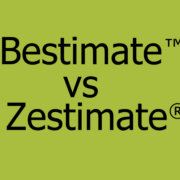How Do You Know What Your Home is Worth? and “The Justifier”
How do you know what your home is worth? Truly worth? In today’s market? This is the million-dollar question. Home sellers wish they had a magic eight ball to tell them the truth.
First, you must understand there are four potentially different valuations for every home. You have Appraised Value, which is used by banks and lenders for refinancing, purchasing, or getting a line of credit, and is many times completely different than Taxable Value, Market Value, or Online Value. How can all four be different? It’s because each one is evaluating the property for a different purpose although the process for achieving each value may be conducted in a similar fashion. The price your home should sell for is Market Value. This is the only value you should be concerned with when considering a home sale.
Appraised Value
Appraised Value is determined for the purpose of securing a loan, which considers a buyer’s qualifying parameters to achieve a value. The bankers request a certain “appraised value” be hit so they can qualify the loan and get the applicant approved for the new loan or line of credit. They provide this number to the Licensed Appraiser up-front to find comparable sales that will “justify” the value requested.
Appraisers should be renamed “Justifiers” because this is what they are paid to do when they are given a value to hit versus finding the Fair Market Value without it. If appraising a property was such an accurate way to value a home, then why not outlaw the Appraiser from being given a value by the Lender to justify? If they are truly doing a Fair Market Value appraisal, shouldn’t they be able to find true market value WITHOUT being told what value they must achieve with their research?
The problem with thinking Appraised Value is always equal to Market Value lies in the fact that bankers don’t treat all applicants equally. Let’s say you have a person who currently owes $100,000 on a home that is valued around $500,000 and the homeowner simply wants to refinance to a lower rate. This is a high-quality loan for any bank to make. The likelihood of this buyer defaulting and walking away from $400,000 in equity is slim to none and would be a huge plus for the bank if it did happen. In this case, the bank may simply order a “drive-by” appraisal. The Appraiser never walks into the home and the value requested is simply confirmed or denied by looking at the home from the curb.
Now imagine the same homeowner wanting to cash out some of the equity in the home and leave a 10% position or $50,000 of equity in the home. You can bet the banker will make sure the Justifier goes over every square inch of that home. All parties involved with originating the loan will scrutinize the value at every level.
The drive-by appraisal method is merely done to make sure the home is in fact built and located where the applicant says it is. The second method will be held to much tighter standards, but it still doesn’t mean the seller could sell the home for the Appraised Value. Don’t get caught up in the mindset that a recent Appraised Value achieved during a refinance is truly what your home could sell for. Your buyer may not have the same qualifications as you do.
The same principles apply to the appraisals for the buyers of your home that submit offers with low down payment and low credit scores versus home buyers with high down payments and high credit scores. If both buyers make the same offer on a home, do you think the appraisals will come out the same? Doubtful! It’s important to understand that an appraisal is merely a step in the qualifying process used to obtain and justify a loan.
Market Value
Market Value is considered the highest price a buyer is willing to pay for a home in an arm’s length transaction in today’s market. An arm’s length transaction is when the buyers and sellers of a product act independently and have no relationship to each other. This is to ensure that both parties are acting in their own self-interest and are not subject to any pressures or duress from the other party. Every future home seller should only be concerned with the true MARKET VALUE of their home. More on this below.
Taxable Value
Taxable Value is usually the least accurate of all values because it’s based on valuation information that isn’t current. One of the top questions I receive from homeowners is “Why is my Taxable Value lower than what I could sell my home for today?” It’s because the taxing authority doesn’t update the value of your property frequently enough to keep up with recent home sales. In fact, they are using sales data that is a couple of years old. Now factor in homestead tax credits, along with other variables, and you get a value for the sole purpose of generating tax revenue, not selling.
Online Value
The Online Value for your home tends to be all over the spectrum of values. There are so many variables to finding the true value of a home that just comparing public data of tax records, and even sold MLS data, will never be able to replace a person physically walking through and assessing a home.
The online valuation websites do not have the ability to take road issues, noise levels, quality of finish, the eye sore of a home next door, and even prior seller motivation into their calculations. If you’re looking for a ballpark pricing figure, you can start here; just know it could be the least accurate of all.
How do you know what your home is worth?
What is the best method for finding out the saleable Market Value of our homes? Will it be the free market in an arms-length transaction? Or the banks and their “too tight” lending processes? It’s such a curiously powerful question that online conglomerates like Zillow® launched their website based on the hope that their Zestimate® would help drive their website traffic through the roof, and it has. Accurate or not, millions of people look to the Zillow® website to value their homes.
Read our post about Property Value for Retirement Planning.
When you’re ready to sell your home, talk with a Homes Sold for More™ agent to get your most accurate Market Value assessment. That’s how you will know what you home is really worth in today’s real estate market.
You can fill out our form and we’ll get in touch with you to gather the necessary facts required to find the true Market Value of your property.
© 2024 Paul Aspelin, REALTOR®. HomesSoldforMore.com Copyright protected. All rights reserved.









Trackbacks & Pingbacks
[…] 3. We met with some retiring sellers who explained they had an appraisal done a year ago to cash out some funds to buy a home in a warmer climate. The appraisal came in at almost double the amount they BUILT the home for eight years ago. The fair market value for selling wasn’t anywhere close to the appraisal amount. See our article about “The Justifier”. […]
Comments are closed.